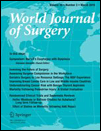Racial Disparities in Operative Outcomes After Major Cancer Surgery in the United States
Shyam Sukumar, Praful Ravi and Akshay Sood have contributed equally to this work.
Electronic supplementary material: The online version of this article (doi:10.1007/s00268-014-2863-x) contains supplementary material, which is available to authorized users.
Abstract
Background
Numerous studies have recorded racial disparities in access to care for major cancers. We investigate contemporary national disparities in the quality of perioperative surgical oncological care using a nationally representative sample of American patients and hypothesize that disparities in the quality of surgical oncological care also exists.
Methods
A retrospective, serial, and cross-sectional analysis of a nationally representative cohort of 3,024,927 patients, undergoing major surgical oncological procedures (colectomy, cystectomy, esophagectomy, gastrectomy, hysterectomy, pneumonectomy, pancreatectomy, and prostatectomy), between 1999 and 2009.
Results
After controlling for multiple factors (including socioeconomic status), Black patients undergoing major surgical oncological procedures were more likely to experience postoperative complications (OR: 1.24; p < 0.001), in-hospital mortality (OR: 1.24; p < 0.001), homologous blood transfusions (OR: 1.52; p < 0.001), and prolonged hospital stay (OR: 1.53; p < 0.001). Specifically, Black patients have higher rates of vascular (OR: 1.24; p < 0.001), wound (OR: 1.10; p = 0.004), gastrointestinal (OR: 1.38; p < 0.001), and infectious complications (OR: 1.29; p < 0.001). Disparities in operative outcomes were particularly remarkable for Black patients undergoing colectomy, prostatectomy, and hysterectomy. Importantly, substantial attenuation of racial disparities was noted for radical cystectomy, lung resection, and pancreatectomy relative to earlier reports. Finally, Hispanic patients experienced no disparities relative to White patients in terms of in-hospital mortality or overall postoperative complications for any of the eight procedures studied.
Conclusions
Considerable racial disparities in operative outcomes exist in the United States for Black patients undergoing major surgical oncological procedures. These findings should direct future health policy efforts in the allocation of resources for the amelioration of persistent disparities in specific procedures.




